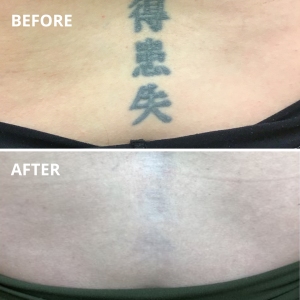- Home
- Blog
- Laser Tattoo Removal
- Tattoo regret: Effective removal treatments and considerations
Tattoo regret: Effective removal treatments and considerations

Tattoo removed after several laser treatments
With tattoos’ popularity on the rise, so are regrets. While our dermatologists have effective tattoo removal treatments, erasing one is not easy. Dr. Kim explains what to expect.
Tattoos are increasingly popular as evidenced by a 2023 Pew Research Center poll, which revealed that 32% of Americans have at least one tattoo. With more inked people, our dermatologists have seen a corresponding rise in tattoo regret from patients. In fact, the poll shows that one in every four individuals have expressed dissatisfaction with their tattoo choices. Common reasons for this tattoo remorse include changes in lifestyle, tattoo decisions made at a young age, and tattoos that serve as enduring reminders of events or people that are no longer significant.
Adding to the mix, permanent make up tattoos and microblading, categorized as semi-permanent cosmetic tattoo, have also become more popular. Nevertheless, issues like tattoo misplacement, gradual fading of ink leading to smudged appearances, and evolving fashion trends have contributed to the surge in tattoo regret.
Among the different approaches to tattoo removal, our physicians found that lasers stand out as the most effective treatment. However, it is worth noting that while acquiring a tattoo can be relatively easy, getting rid of one, even with the aid of lasers, is notably more challenging. Laser technology works by pulverizing tattoo pigments into smaller particles, enabling the body to eliminate them more efficiently. Interestingly, professionally inked tattoos are generally more challenging to treat compared to amateur tattoos. Tattoos containing multiple colors also present more removal difficulties compared to black tattoos. It is important to know that multiple treatments are usually needed for all tattoos, and complete clearance cannot be guaranteed.
Laser technology advancements in recent years, specifically the introduction of picosecond lasers, have helped expand our treatment options for tattoo removal. Along with the established Q-switched alexandrite, ruby or Nd:YAG lasers, the common purpose of these lasers is to break down tattoo particles embedded in the skin into smaller fragments allowing the body’s “housekeeping” immune cells to eliminate them. The distinguishing feature of lasers lies in their precision, as they target just the tattooed area without injuring the surrounding skin. Consequently, lasers carry a lower risk of scarring or permanent discoloration compared to other tattoo removal modalities such as dermabrasion and excision.
It is important to understand that every tattoo is unique. Treatment within the same tattoo, or different tattoos on the same individual, may yield different results since the distribution of tattoo particles and how the body absorb them differ in the skin. Therefore, some areas of a tattoo may fade more rapidly following treatment than others. Moreover, the multiple sessions are usually scheduled several months apart, and sun avoidance on the tattoo before and after treatments is recommended.
If you find yourself burdened by a tattoo that you regret, know that you don’t have to keep it. Consider making an appointment with one of our experienced dermatologists to see if a laser treatment is right for you.



Leave a Reply